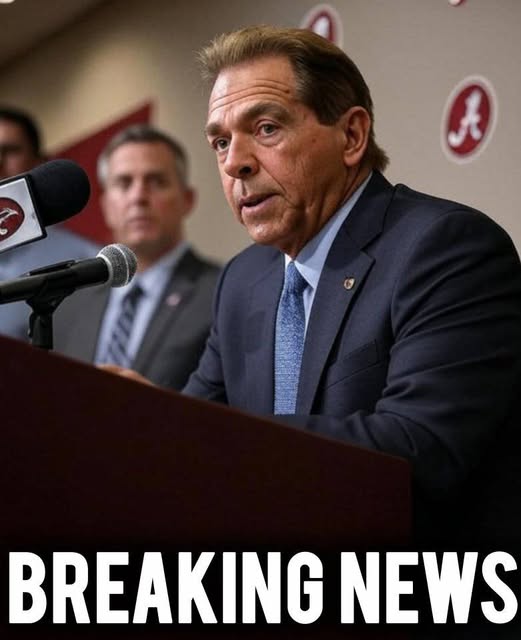In a stunning development that has sent shockwaves through the world of college football, legendary coach Nick Saban is officially returning to the University of Alabama, not as head coach this time, but in a pivotal new role as Senior Coaching Advisor to the football program. After announcing his retirement from coaching earlier this year, many believed that Saban’s iconic run in Tuscaloosa had come to a close. But in a twist befitting his legacy of reinvention and dominance, the 72-year-old Hall of Famer is once again stepping into the spotlight, this time with a focus on mentorship, strategy, and long-term vision for the Crimson Tide.
Nick Saban’s return is more than ceremonial. While he won’t be pacing the sidelines or calling plays on Saturdays, his influence is poised to be felt in every corner of Alabama’s football operation. The university confirmed that Saban will work directly with new head coach Kalen DeBoer, providing guidance on program structure, recruiting philosophy, and overall strategic direction. For Alabama, this is a calculated masterstroke—bringing back the architect of six national titles during his 17-year tenure to shepherd the next generation of success.
Saban’s decision to step into this new advisory role isn’t entirely unexpected for those close to the program. Though he retired from coaching, Saban never hinted at stepping away from football entirely. In fact, many within college football circles believed it was only a matter of time before he returned in some capacity. Known for his relentless energy, intellectual curiosity, and obsession with details, Saban seemed ill-suited for a quiet retirement. Those instincts have proven correct.
His new position is believed to be modeled somewhat after the NFL’s front office advisor roles, wherein legendary former coaches help shape franchise philosophy without being involved in day-to-day playcalling or game management. At Alabama, Saban’s role is expected to be deeply involved in behind-the-scenes elements of program development. This includes sitting in on strategic planning meetings, evaluating high school talent with the recruiting department, advising on assistant coach hires, and serving as a bridge between the program’s storied past and its ambitious future under DeBoer.
For DeBoer, who steps into one of the most pressure-laden roles in American sports, having Saban nearby is both a blessing and a challenge. On one hand, the insight and support from arguably the greatest college football coach in history will be invaluable. On the other hand, DeBoer must now navigate the high expectations of winning at Alabama while coexisting with a larger-than-life presence who built the dynasty he is now tasked with continuing. Early signs suggest a harmonious relationship, with DeBoer reportedly welcoming Saban’s presence and praising his commitment to the university’s long-term success.
Reactions from across the football world have been swift and emotional. Former players, fellow coaches, analysts, and fans have all weighed in, with most applauding Alabama for maintaining continuity and reinforcing a culture of excellence. Many have pointed out that Saban’s legacy, while already immortalized in championships and accolades, gains a new chapter with this move—a chapter that could help shape not just Alabama football, but the evolution of the college game itself.
The timing of Saban’s return is significant. College football is undergoing seismic changes with the rapid development of NIL (Name, Image, Likeness) compensation, conference realignment, expanded playoffs, and increasing professionalization of the sport. Programs that can adapt quickly will survive and thrive. Those that don’t risk falling behind. Alabama has made a statement that it plans to stay ahead of the curve by bringing back the sharpest mind in the game to navigate this complex new era.
Saban’s career has always been defined by adaptation. From his early days coaching defensive backs under Don James, to winning a national title at LSU, to his brief stint in the NFL with the Miami Dolphins, and then ultimately transforming Alabama into the standard-bearer of college football, he has shown an unmatched ability to evolve. His return as Senior Coaching Advisor is another example of that ability. This role allows him to continue impacting the sport he loves while shifting away from the grind of recruiting visits, game-week preparation, and postgame press conferences.
In his new capacity, Saban is expected to serve as a key figure in Alabama’s recruiting outreach. While he won’t be on the trail visiting prospects, his presence and endorsement of the program will carry enormous weight. Recruits and their families often cite the “Saban Effect”—the idea that playing under or within a system associated with him leads to NFL opportunities and personal development. That effect won’t diminish. If anything, it may grow stronger as Saban now has time to focus on broader strategy rather than the week-to-week battles of the football season.
Athletic Director Greg Byrne, in announcing Saban’s appointment, emphasized the university’s commitment to continuity and innovation. “Coach Saban built the gold standard here at Alabama. His expertise, leadership, and vision are still incredibly valuable to our athletic department. We are thrilled to have him back as a Senior Coaching Advisor, where he will help ensure Alabama football remains a national powerhouse.”
Saban’s influence will also likely be felt in staff development. Throughout his career, he built a coaching tree that now stretches across the college and professional ranks. Lane Kiffin, Kirby Smart, Steve Sarkisian, Jimbo Fisher, and many others learned under his leadership. As an advisor, Saban will help groom the next wave of coaching talent, possibly even influencing future head coaching hires and staff restructuring efforts. His understanding of program culture, discipline, and attention to detail could help Alabama remain dominant long after his direct involvement ends.
For Alabama fans, the announcement comes as a mix of nostalgia and renewed hope. Saban’s retirement, while expected due to his age, marked the end of a golden era. But now, with his return in an official capacity, there’s a feeling that the Crimson Tide dynasty is not only intact—it’s reloading. Saban’s legacy is no longer just about the past; it’s about protecting the future. His presence signals to recruits, fans, and rivals that Alabama still holds the blueprint for greatness.
The move also sets a precedent for other programs. As more legendary coaches retire in coming years, universities may look to create similar advisory roles to retain institutional knowledge and competitive edge. Saban’s transition could become a model for how programs maintain stability through leadership change. It allows a smooth transfer of day-to-day control while retaining long-term strategic influence.
Though it’s clear Saban won’t be making game-time decisions or calling plays, insiders report that he will have access to film reviews, practice evaluations, and talent assessments. His feedback, while not binding, will be taken seriously. The lines of authority are well-drawn: DeBoer is the head coach, with full autonomy over football operations. But Saban’s insights will shape discussions, offer alternatives, and reinforce the values that turned Alabama into a dynasty.
There’s also a broader philosophical dimension to his new role. College football, in many ways, has become unrecognizable from the sport it was when Saban first arrived at Alabama in 2007. The transfer portal, NIL money, and athlete branding have reshaped the landscape. But at its core, the game still rewards preparation, discipline, toughness, and execution—all hallmarks of the “Process” Saban famously championed. His job now is to ensure that those values don’t get lost in the noise. His advisory presence will help the program stay grounded in its identity while embracing necessary evolution.
Saban’s legacy was already secure. He retires as one of the winningest coaches in history, the owner of multiple national championships, and the builder of perhaps the most impressive dynasty in college football’s long history. Yet his return as an advisor speaks to something deeper: a lifelong commitment to the sport, a desire to mentor, and an undying allegiance to the University of Alabama.
For his former players, it’s an affirmation that the bond they built with him wasn’t limited to four years on campus. For his former assistants, it’s another chapter in their own mentorship. And for the next generation of players and staff in Tuscaloosa, it’s an extraordinary opportunity to learn from a master—one whose knowledge spans eras, philosophies, and styles, but always returns to a fundamental truth: excellence is a habit.
Only time will tell how long Saban will remain in this new advisory capacity. But his return sends an unmistakable message: Alabama is not done. The Process continues. And its greatest architect is still in the building, guiding from the shadows, ensuring that the Crimson Tide stays as fearsome in the future as it has been in the past.



